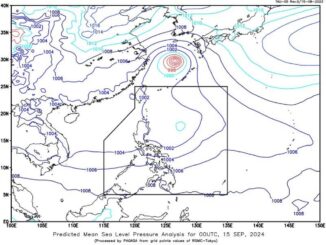
First of two parts
BLOOD oozed from the bullet wound to the head of Jossie Mondejar, 54, who was found on the floor outside her house in Sitio Beranio, in Silay City, Negros Occidental, on Feb. 1, 2024.
Police at the scene learned that Mondejar had been shot point blank by her 18-year-old nephew, Alfredo Bitalac Jr., as his older brother, Aljun, stood by.
The brothers fled, and Mondejar was taken to the hospital, where she died. The suspects were later arrested in the same barangay.
Silay police chief LtCol. Mark Anthony Darroca said Aljun, a Philippine Drug Enforcement Agency agent on vacation, had threatened his aunt a few days ago over a wall she was building in the compound, separating their houses. Apparently, there was a history of bad blood that culminated in Mondejar’s killing, which investigators attributed to a land dispute.
The Mondejar case is just one example of family land disputes turning deadly, and experts who have studied the phenomenon say it isn’t all that surprising, given the emotions that these arguments stir up.
“A strong emotional attachment to the land can be a driving factor in this scenario. Individuals frequently develop deep emotional ties to their land, particularly if it has been in the family for a long period,” says Argel Masanda, forensic psychologist and professor at the National University Philippines.
“Even with close family, this relationship may cause them to become extremely guarded and hesitant to give in.”
Cases over property disputes most often unearth long-held resentments, unresolved anger, and historical trauma, which have been passed down through generations. In family conflicts, the deeply rooted emotions are quite difficult to unpack and heal from.
Inheritance practices predominantly favor the first-born male child. As the eldest inherits most of the shares, this triggers resentment from other family members and often leads to sibling rivalry.
The gender roles and family structure associated with most Filipino families are very influential and play a significant role in land disputes.
“Land disputes significantly disrupt the social and economic stability of affected communities. For farmers and smallholders, land grabs and forced evictions mean the loss of livelihoods, homes, and community cohesion,” says Rachel Cox, strategic campaign lead for Land and Environmental Defenders at Global Witness, which investigates and advocates for the rights and protection of land and environmental activists worldwide.
Sibling rivalries over ancestral properties
Ricardo Pilares Jr., a lawyer at Pilares Law Firm, said the descendants inheriting ancestral properties go after prime properties that he considers the biggest fight in most property cases he handles.
“With respect to the families, you know what is called jealousy [among them]. That is prominent, from what I see, when sharing is involved, especially [when the lot of the testator] is located in different areas. Based on our experience, and most lawyers say this, the hardest to settle are land disputes involving members of the same family compared to corporations,” Pilares says.
Resentment and stronger emotions in siblings and children can be triggered by a sense of being cheated out of their rightful inheritance. Family members may feel a perceived threat to their identity and the security of having a home. In some cases, daughters may be excluded from property inheritance, while relatives with multiple generations residing on a property can pose a big challenge to many families, Masanda says.
Violence arising from land disputes
“People with traits such as high neuroticism and low agreeableness have strong tendencies to commit violent actions in triggering situations, especially when their properties are at stake. Moreover, people with Antisocial Personality Disorder might have difficulty empathizing with people having a property dispute and unable to understand their perspective on fighting for what is important to them,” Masanda says.
Victims of violence or those witnessing a crime can be traumatized, and the uncertainty and worrying over land disputes may cause long-term distress and a sense of powerlessness. The loss of property can lead to depressive and dismal thoughts, particularly if it symbolizes family history or financial security.
Masanda compares losing ancestral lands to the deep grief of losing a loved one. Victims may feel severe anger and resentment toward the offender due to mistreatment or the feeling of being cheated out of a legitimate inheritance, putting a severe strain on interpersonal bonds.
Families have been torn apart by land disputes, leading members to feel social exclusion and betrayal. Victims find it difficult to trust, particularly those who are embroiled in the fight. They may experience feelings of vulnerability and insecurity, particularly if the disputed property is their main source of income or subsistence.
“There could be an inter-generational transmission of trauma, especially if parents or grandparents experienced violence or unresolved anger related to property disputes; it can be passed down to future generations,” Masanda adds.
A history of unresolved arguments or hostility in families may lead tensions to flare up. As old resentments resurface, they often make compromise difficult and fuel anger. Frustration may build up quickly over emotionally charged discussions on properties.
“There are families with established patterns of manipulation, emotional abuse, or power struggles [who are] more susceptible to violence during disputes. These dynamics can create an environment where aggression is seen as a normal way to get ahead,” Masanda explains.





Be the first to comment